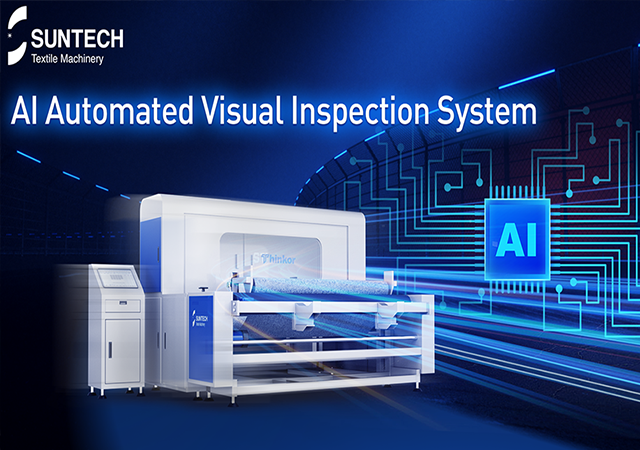Smart manufacturing in the textile industry is revolutionizing the way textiles are produced by integrating advanced technologies and data-driven processes. This approach enhances efficiency, productivity, and sustainability in textile manufacturing. Key technologies involved include automation, robotics, artificial intelligence (AI), Internet of Things (IoT), data analytics, and other digital tools to optimize various aspects of textile production.
Key Aspects of Textile Smart Manufacturing
1. Automation:
Smart manufacturing employs automated systems and robotics to streamline processes such as material handling, cutting, sewing, and packaging. These technologies improve production speed, accuracy, and consistency while reducing labor requirements and costs.
SUNTECH Textile Machinery Automation:
SUNTECH Textile Machinery has been at the forefront of this transformation with technologies like ST-Thinkor and AGV. The ST-FL, an automated guided vehicle shaped like a forklift, exemplifies this innovation by significantly enhancing efficiency and cost-effectiveness in material handling, tailored specifically for the textile industry’s needs.
SUNTECH continues to innovate, with a strong focus on integrating AI over the next 2-3 years, positioning AI as a strategic driver for the industry's future. This integration promises to elevate intelligence levels across various textile domains, ushering in profound changes and opportunities for growth and efficiency.
2. Internet of Things (IoT):
IoT sensors and devices collect real-time data from machines, equipment, and processes. This data is essential for monitoring machine performance, identifying maintenance needs, tracking inventory levels, and optimizing production schedules. IoT enables seamless data exchange and decision-making across the manufacturing ecosystem.
3. Artificial Intelligence (AI):
AI technologies, including machine learning and computer vision, analyze large volumes of data to identify patterns, predict maintenance needs, optimize production parameters, and detect quality issues. AI-powered systems enable predictive maintenance, minimizing downtime by identifying potential machine failures in advance.

ST-Thinkor:
The SUNTECH AI Automated Visual Inspection System, ST-Thinkor, is widely adopted across various industries such as fabric production, garment manufacturing, home textiles, electronic and industrial glass fiber production, automotive interiors, and non-woven fabric production, among others.
4. Data Analytics and Predictive Modeling:
Collecting and analyzing data from production processes, supply chains, and customer feedback provides valuable insights for improving operational efficiency and product quality. Predictive modeling helps forecast demand, optimize inventory levels, and anticipate production bottlenecks.
5. Sustainable Manufacturing Practices:
Smart manufacturing promotes sustainability in the textile industry by optimizing resource utilization, reducing waste, and minimizing energy consumption. Data-driven insights identify areas for improvement, facilitating the adoption of sustainable practices throughout the supply chain.
6. Supply Chain Integration:
Integrating stakeholders within the supply chain, including suppliers, manufacturers, distributors, and retailers, through real-time data sharing and collaboration optimizes efficiency, inventory management, and responsiveness to customer demands.
Smart manufacturing in the textile industry offers significant opportunities for increased productivity, quality control, sustainability, and cost savings. By leveraging advanced technologies and data-driven insights, textile manufacturers can adapt to changing market dynamics, enhance competitiveness, and meet evolving customer demands in a rapidly changing industry.




